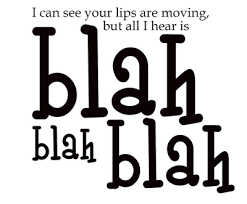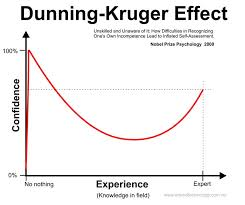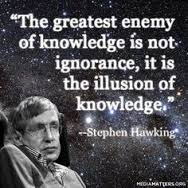“One of the painful things about our time is that those who feel certainty are stupid, and those with any imagination and understanding are filled with doubt and indecision”
– Bertrand Russell, The Triumph of Stupidity
Visualise this. You are in a meeting. You are well conversant with the subject of the meeting. The  meeting starts and you realize that someone who partially knows the subject or does not know the subject is speaking a lot on the subject. You wonder what’s happening and where the meeting is headed.
meeting starts and you realize that someone who partially knows the subject or does not know the subject is speaking a lot on the subject. You wonder what’s happening and where the meeting is headed.
Sounds familiar? Whether its Office meetings, society meetings or community meetings, we come across such situations.
Person with the knowledge of the subject is many a time in dilemma regarding the completeness and correctness of her information and hence prefers to remain silent. Someone who has lesser understanding or no knowledge goes on to speak, and quite confidently.
“Empty vessels make the greatest/loudest noise/sound”, is what we recall and solace ourselves during such moments.
Why does this happen?
This phenomenon is called the Dunning–Kruger effect. The phenomenon was first tested in a series of experiments by David Dunning and Justin Kruger of Cornell University. Hence the name.
This phenomenon occurs when people fail to adequately assess or recognise their level of competence or specifically their Incompetence. The inability to assess  or recognise this incompetence deprives them from critically examining or analyzing their performance. This leads to people making significant overestimation about them.
or recognise this incompetence deprives them from critically examining or analyzing their performance. This leads to people making significant overestimation about them.
Does the inverse of it true? According to Dunning and Kruger it is. Competent people tend to underestimate their ability compared to others. The duo calls this the imposter syndrome. The more knowledge or skill the person has the higher is the feeling she gets of how ignorant she is. While this may keep the person grounded and committed to the subject, sometimes this feeling does not allow making adequate and forceful representation at forums.
For the incompetently confident person, Dunning summarizes the effect as:
“What’s curious is that, in many cases, incompetence does not leave people disoriented, perplexed, or cautious. Instead, the incompetent are often blessed with an inappropriate confidence, buoyed by something that feels to them like knowledge.”
Dunning and Kruger proposed that, for a given skill, incompetent people will:
- fail to recognize their own lack of skill
- fail to recognize genuine skill in others
- fail to recognize the extremity of their inadequacy
- recognize and acknowledge their own previous lack of skill, if they are exposed to training for that skill
What can we do as individuals?
Besides taking the professional certifications that may be the threshold requirement to do a particular job or a project, I have seen many of my friends and colleagues use an appropriate self-assessment method. They periodically use it to check if they are getting into the trap of less than adequate skills but an overestimated self-perception and vice versa.
Here are some of the methods they use that may help you and me.
- They benchmark with someone who is very good at the skill they want to acquire and constantly check the progress against the benchmark.
- They have trusted confidants who can show them the mirror.
- They show openness to feedback (Formal and informal) from family, friends and colleagues and show agility to work upon the feedback.
- They endeavor to build awareness about their strength and use it when required.
Do let me know if this information and awareness has helped you in your journey of personal effectiveness.